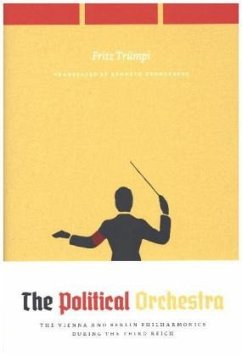This is a groundbreaking study of the prestigious Berlin and Vienna Philharmonics during the Third Reich. Making extensive use of archival material, including some discussed here for the very first time, Fritz Trümpi offers new insight into the orchestras' place in the larger political constellation. Trümpi looks first at the decades preceding National Socialist rule, when the competing orchestras, whose rivalry mirrored a larger rivalry between Berlin and Vienna, were called on to represent "superior" Austro-German music and were integrated into the administrative and social structures of their respective cities - becoming vulnerable to political manipulation in the process. He then turns to the Nazi period, when the orchestras came to play a major role. As he shows, each philharmonic, in its own unique way,became a tool of soft power by showcasing Germanic culture through the mass media, performances for troops and the general public, and fictional representations in literatureand film. Accompanying these propaganda efforts was an increasing radicalization of the orchestras, which ranged from the dismissal of Jewish members to the programming of ideologically appropriate repertory - all in the name of racial and cultural purity. Richly documented and refreshingly nuanced, The Political Orchestra is a bold exploration of the ties between music and politics under fascism.
Bitte wählen Sie Ihr Anliegen aus.
Rechnungen
Retourenschein anfordern
Bestellstatus
Storno

